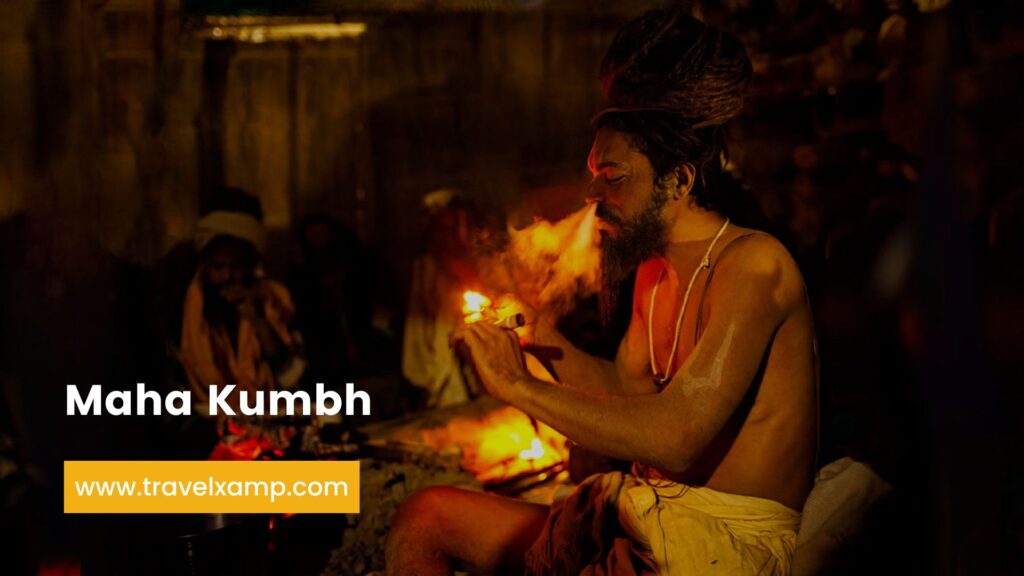Table of Contents
The year 2025 commenced with a bang marked by the significant and highly anticipated spiritual event of the year, the Mahakumbh. Celebrated worldwide for its vibrant and diverse culture, India has attracted global attention, bringing in millions of visitors to witness the cultural extravaganza of Mahakumbh 2025. This event stands out as one of the most effective efforts to spotlight Indian culture and traditions while also contributing to the country’s economy and influencing the current political landscape.

Embedded in the traditions and principles of Hinduism, the Mahakumbh holds immense significance in Indian scriptures. Immersing oneself in the holy waters with the faith of cleansing sins, gaining punya and breaking the cycle of rebirth to attain salvation has consistently been a fundamental idea. To achieve this punya, Indian scriptures encourage individuals to endure suffering and demonstrate their determination. However, with the evolving times and ideology, this spiritual journey has evolved too, from diving into the sacred water to aligning towards the modern shores.
Mahakumbh 2025: Mythological Origins to Materialistic Shift
The origins of Mahakumbh trace back to the times of Rigveda, one of the ancient texts of the Indian Knowledge system. The Kumbh has its genesis in the very famous “Samundra Manthan” (churning of the cosmic ocean. It is said that in the Samudra Manthan process, an elixir of immortality known as Amrit was produced, leading to a fierce conflict between the Devas (gods) and the Asuras (demons) over its possession. During this struggle, a few drops of the nectar fell at four locations on Earth: Prayagraj, Haridwar, Nashik, and Ujjain, where the Kumbh Mela is now celebrated every few years. The Mahakumbh Mela occurs once every 144 years, following the completion of 12 Poorna Kumbhs, which take place every 12 years. The ongoing Kumbh is taking place due to the completion of 12 years but is called “Mahakumbh” because of the unique celestial arrangement this year.

Nonetheless, Mahakumbh 2025 is recognized globally mainly for its extravagant amenities and as a tourist attraction for some recreation, with its mythological roots and significance coming in a distant second. The media spotlight is primarily on the luxurious facilities, the integration of cutting-edge technologies, and the rising enthusiasm among the crowd eager to attend the event, besides its cultural importance and only for its global allure. The rising sales of souvenirs, religious products and merchandise are overshadowing the importance of the holy water of the Sangam. Influencers are seeking it as an opportunity to get social validation rather than an internal and spiritual transformation.
Mahakumbh: From Rituals rooted in Perseverance to Wrapping them up in Consumerism
Every Indian festivity is rooted deep in the traditions and rituals and so is the Kumbh. Being one of the most important events of the Hindu festive series, Mahakumbh involves some crucial and difficult rituals leading to the path of salvation.
Aarti
Similar to every other festival or auspicious occasion, Mahakumbh also begins with the “Aarti”, involving the offering of sacred flames to the deities on the bank of Sangam (convergence of Ganga, Yamuna and Triveni).
Shahi Snan
Following this is the key and most emphasized ritual, “The Shahi Snan,” which is rooted in the belief that immersing oneself in the holy water cleanses the sins. This tradition sees numerous devotees plunging into the water simultaneously and serves to assess their commitment. Nevertheless, during Mahakumbh 2025, this won’t be the case, as there are accommodations for personal tents and designated areas for individual dips!
Kalpavas
According to the Puranas, these are the days from Ekadashi of the full moon to Maghi Ekadashi during the Paush month in the Hindu calendar. These days, 21 rituals should be observed, including non-violence, which can seem quite challenging amidst the throng of millions vying for photos and videos. Speaking the truth, controlling the senses, and showing kindness to all living beings is essential, although Mother Nature will bear the consequences of the waste and pollution generated by the anticipated 400 million people. Additionally, one should practice celibacy, rise before dawn, refrain from indulgence, perform “Trikal Sandhya,” assist ascetics, and donate according to one’s ability, among other practices.
Deep Daan
One of the mystical rituals is of “deep daan” i.e. liting of oil-filled lamps on the floating river. The view is magical and spreads positivity.
Pryagraj Panchkoshi Parikrama
The final ritual involves the Parikrama (circumambulation) exhibiting the impact of changing times.
Mahakumbh 2025 is truly a magical time for Indians, radiating a positive aura that uplifts spirits across the nation. The grandeur of this celestial gathering is nothing short of a divine blessing, and its significance remains unparalleled. However, with the passage of time, a subtle shift is emerging. The once deeply spiritual roots of perseverance, determination, and devotion are being overshadowed by the growing emphasis on economic, political, and materialistic aspects of this sacred event.
This shift serves as a reminder of the urgent need to preserve India’s rich traditions and cultural heritage. Thankfully, the Sadhus, Nagas, and Aghoris continue to safeguard the essence of the Kumbh, offering the younger generation a rare glimpse into the true path of spiritualism. Their presence serves as a beacon of hope, inspiring a renewed connection with the deeper meanings of faith and introspection.
Mahakumbh 2025 is not just an event, it is a call to reconnect with our spiritual roots while celebrating the timeless values that define our culture. Let us cherish and protect this incredible legacy for generations to come so that it doesn’t get lost in the glamour of materialism.
(Travel Xamp is now on Telegram. Join our Telegram by clicking here to get all the travel hacks, destinations, blogs, and travel news for free!)
